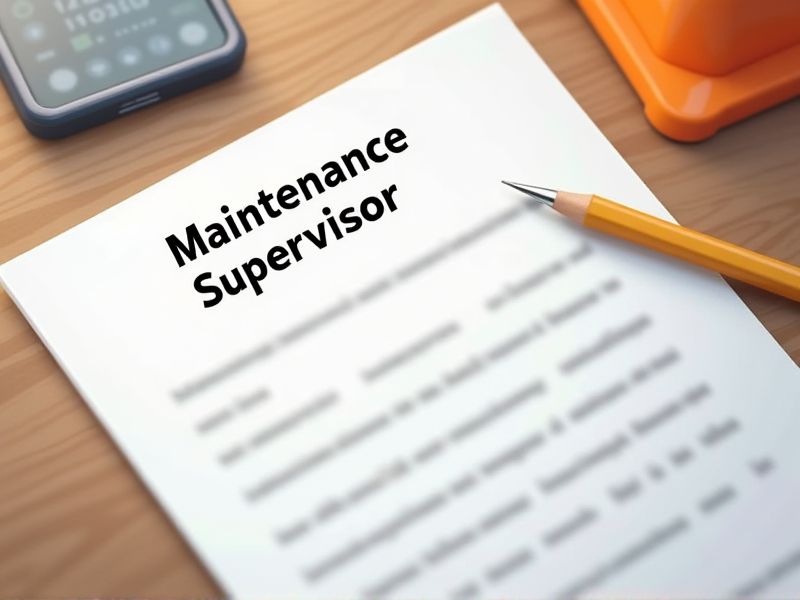
A Maintenance Supervisor certified in Maintenance Management often handles complex systems that require specialized knowledge. Certifications ensure they possess the technical expertise necessary to maintain and improve equipment efficiency. These credentials also demonstrate a commitment to industry standards and the ability to lead a maintenance team effectively. Below are essential certifications that could benefit a Maintenance Supervisor in this field.
Certified Maintenance & Reliability Professional (CMRP)
Having a CMRP certification improves a Maintenance Supervisor's skill set, aligning it with industry standards for maintenance and reliability. This certification provides a comprehensive understanding of predictive maintenance strategies, enabling more effective decision-making processes. Companies often report reduced downtime and maintenance costs when their supervisors hold CMRP credentials, boosting overall operational efficiency. CMRP certification also enhances career prospects by demonstrating a validated commitment to maintaining high reliability and performance standards.
Certified Maintenance Manager (CMM)
Certified Maintenance Manager (CMM) certification enhances a maintenance supervisor's expertise by deepening their understanding of asset management strategies. The CMM credential raises a supervisor's leadership skills, equipping them to effectively manage teams and optimize workflow processes. This certification provides industry-standard knowledge that aligns maintenance practices with current technological advancements. Employers value CMM certification as it boosts organizational efficiency, ensuring facilities operate with reduced downtime and lower operational costs.
Reliability Centered Maintenance (RCM) Certification
Maintenance Supervisors certified in Maintenance Management benefit from Reliability Centered Maintenance (RCM) Certification by gaining a deeper understanding of asset reliability and failure modes, which enhances decision-making. The certification equips them to identify critical equipment and prioritize maintenance strategies, improving operational efficiency. It aligns maintenance practices with organizational goals, reducing costs associated with unexpected failures. Enhanced skills in RCM lead to improved equipment uptime and longevity, directly impacting business productivity.
OSHA 30-Hour Safety Certification
Securing an OSHA 30-Hour Safety Certification enhances a Maintenance Supervisor's understanding of workplace safety standards and protocols, crucial for accident prevention. This certification equips supervisors with the ability to effectively identify and mitigate hazards, thus fostering a safer work environment. Comprehensive training in OSHA standards ensures compliance, reducing the risk of legal penalties and workplace disruptions. By prioritizing safety, maintenance supervisors improve operational efficiency and enhance team morale through a demonstrated commitment to worker protection.
Six Sigma Green Belt Certification
A Maintenance Supervisor certified in Maintenance Management benefits from Six Sigma Green Belt Certification by gaining expertise in reducing operational inefficiencies that lead to cost savings. The certification enhances their ability to analyze data-driven metrics, thus improving predictive maintenance strategies and minimizing equipment downtime. It also equips them with robust problem-solving skills, facilitating smoother communication and collaboration with cross-functional teams. Their leadership in continuous improvement initiatives can lead to sustainable operational excellence and a competitive advantage for the organization.
Certified Plant Maintenance Manager (CPMM)
Having a CPMM credential helps a Maintenance Supervisor with certified Maintenance Management by aligning their skills with best practices and industry standards. The certification increases the supervisor's ability to implement effective maintenance strategies, which can reduce equipment downtime and improve operational efficiency. CPMM equips supervisors with advanced problem-solving techniques that are critical for identifying and mitigating risks associated with maintenance activities. Recognition as a CPMM can enhance credibility and open avenues for career progression within the maintenance sector.
Facility Management Professional (FMP)
Maintenance Supervisors certified in Maintenance Management often focus primarily on the operational and technical aspects of maintenance. By obtaining a Facility Management Professional (FMP) certification, they gain a broader understanding of facility systems, aligning maintenance practices with overall organizational goals. This added skill set improves strategic decision-making and resource allocation, which enhances efficiency and sustainability. Consequently, an FMP certification allows maintenance supervisors to effectively integrate maintenance management within the larger framework of facility operations, driving value and promoting long-term asset management.
Total Productive Maintenance (TPM) Certification
A Maintenance Supervisor certified in Maintenance Management benefits from Total Productive Maintenance (TPM) Certification because it integrates advanced maintenance strategies aimed at improving machinery efficiency. TPM Certification equips supervisors with the skills to reduce downtime, which in turn increases production reliability and efficiency. Understanding TPM involves mastering preventive maintenance techniques that lead to reduced operational costs and prolonged equipment lifespan. This certification enhances the supervisor's capability to foster a culture of continuous improvement within their team, aligning maintenance goals with broader organizational objectives.
Certified Energy Manager (CEM)
Certified Energy Managers (CEMs) are crucial for Maintenance Supervisors because they bring specialized knowledge in optimizing energy efficiency, which can significantly reduce operational costs. A CEM can identify areas where energy consumption is excessive and provide actionable solutions, leading to more sustainable practices. Maintenance Supervisors benefit from these insights by integrating energy-efficient practices into their regular maintenance routines, improving overall facility performance. CEMs' expertise ensures adherence to energy regulations, thus avoiding potential penalties and enhancing the organization's compliance profile.
Lean Maintenance Management Certification
Lean Maintenance Management Certification provides supervisors advanced techniques specifically focused on waste reduction, which increases efficiency in maintenance operations. Maintenance supervisors certified in general maintenance management get tools tailored to lean processes, empowering them to streamline workflows. Employers observing this certification gain confidence in the supervisor's ability to align maintenance strategy with lean principles. Industry competitiveness often demands continuous improvement and a lean certification enhances a supervisor's skill set, making them better equipped to lead teams in a rapidly evolving environment.
Summary
You, as a Maintenance Supervisor, can expect enhanced efficiency and effectiveness in your role by obtaining certifications in Maintenance Management. Certifications provide comprehensive knowledge and skills, leading to improved team coordination and resource management. This qualification can lead to increased job satisfaction and career advancement opportunities. A team under your supervision will experience reduced downtime and cost savings, benefiting the organization's overall operational goals.
